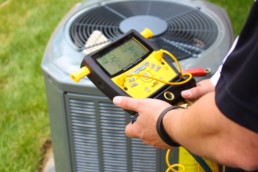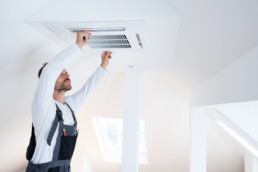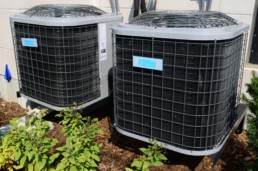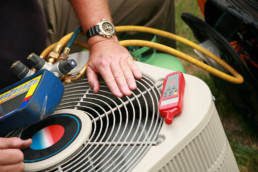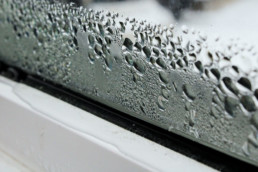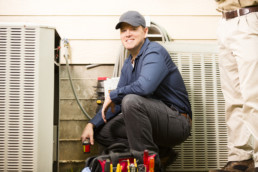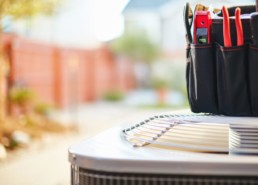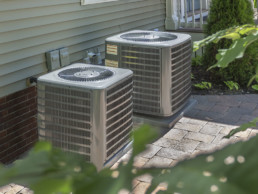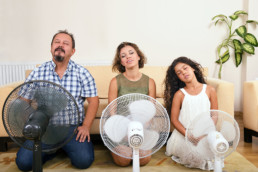Top 10 Questions to Ask Your Potential HVAC Contractor
Finding an HVAC contractor in your city won't be difficult to do. There are more than 100,000 HVAC contractors in the country today, which means there should be more than a few options in your general area.
But finding the best HVAC contractor? That's a different story! Since there are so many HVAC contractors, you'll need to do your homework to find the right one to provide you with HVAC services.
One way to do it is by asking HVAC questions to as many contractors in your city as you can find. This will help you narrow down your search and show you which HVAC contractors are worth your time.
Here are 10 questions to ask potential HVAC contractors.
1. How Long Have You Been an HVAC Contractor?
If an HVAC contractor just started working on HVAC systems last week, they're not the best option for you. An HVAC contractor doesn't necessarily need 50 years under their belt to perform most HVAC services, but that doesn't mean you should trust someone with no experience, either.
One of your first HVAC questions should be about an HVAC contractor's experience level. You want to know that they'll know what they're doing while working on your home's HVAC system.
2. Are You Fully Licensed and Insured?
You should not, under any circumstances, work with an HVAC contractor that isn't fully licensed and insured.
Ask for an HVAC contractor's business license number and tell them you need to see a copy of their HVAC insurance policy. If they hesitate to provide you with either of these things, move on to your next option.
3. Do You Work With Residential or Commercial Clients?
There are some HVAC contractors who specialize in working on the HVAC systems in homes. There are others who work exclusively on HVAC systems in businesses. Some also do some combination of both.
Assuming you need an HVAC contractor for your home, you should check to see that the HVAC contractor you're speaking with deals with homeowners on a regular basis.
4. What HVAC Services Do You Offer?
Most HVAC contractors offer the same basic services. They can help you install, maintain, and repair any aspect of your HVAC system.
But some also offer services that are outside the normal scope. For example, some HVAC contractors will do air duct cleaning for you and improve your indoor air quality.
If you need services like these, it's always a good idea to ask an HVAC contractor if they're capable of providing them. Not all of them are up for the challenge.
5. How Much Do Your HVAC Services Cost?
Cost shouldn't be your No. 1 concern when you're looking for an HVAC contractor. That's why we didn't put cost as the top question on this list of HVAC questions.
But you will obviously want to consider how much an HVAC contractor charges to, say, install a new air conditioner in your home. The national average for a new AC unit installation is about $5,000, but different HVAC contractors in your area will charge different amounts.
Feel free to ask about the costs associated with each service an HVAC company provides.
6. Do You Offer Any Warranties or Guarantees?
When hiring an HVAC contractor, you want someone who will stand behind their work. They should extend warranties and/or guarantees on the products and services they sell. This will give you an unparalleled peace of mind when you work with a contractor.
7. What Are Your Business Hours?
Most good HVAC contractors do more than just work 9 to 5 every day. More often than not, they'll put in long hours to make sure their customers are satisfied. They'll even come out to your home after-hours if you need them to.
8. How Fast Could You Come to My Home?
Do you have an emergency situation on your hands that requires the attention of an HVAC contractor right away? Or do you want to make sure your new AC is installed before next week when your family comes into town?
Talk to your HVAC contractor about whether or not they can provide you with prompt services. You may have to pass on working with a perfectly good HVAC contractor because they're not able to send someone to your home fast enough.
9. Can You Provide References?
In 2019, it's never been easier for homeowners to track down online reviews for HVAC contractors. You can find dozens of reviews for the HVAC contractors in your area by conducting a simple Google search.
But you can also ask HVAC contractors themselves to provide you with reviews and set you up with the names and numbers of a few references. It helps to know what other people have had to say about a contractor before hiring them to do a job.
10. What Sets You Apart From Your Competition?
As we mentioned earlier, there will be no shortage of HVAC contractors in your area trying to attract your business. They'll all tell you that they're better than the next contractor and able to provide you with superior services.
Have them tell you what sets them apart from the other HVAC contractors that you've spoken to. They should talk at length about how they have an outstanding reputation in the area and strive to keep their customers 100 percent satisfied.
The answer to this question, coupled with all the others, will let you know whether or not an HVAC contractor means business.
Ask These HVAC Questions to Different Contractors
Ask five or ten HVAC contractors in your area the HVAC questions found here.
When you do, we don't think that any of them will give you the same great answers that we will. We're committed to our customers and promise to provide you with the best possible HVAC products. We guarantee all the work that we do and make it our mission to leave our customers happy with our services.
Contact us today to schedule an appointment or to ask any questions you might have about our extensive HVAC experience.
How to Find the Best Air Conditioning Company in North Port
You rely on your HVAC system to keep your home comfortable. And those units are designed to last! The average lifespan of most residential HVAC systems is between 12 and 15 years.
But those units need frequent maintenance and timely repairs to keep your home comfortable for years.
Without them, you’ll be left with unexpected breakdowns and high repair costs. But how do you even start finding an experienced air conditioning contractor in the first place?
Read on! In this guide, we’ll go over a few simple tips to help you find the best air conditioning company in North Port.
Ask Your Friends
The best place to start when searching for a reliable HVAC contractor is with your friends, family, and coworkers. Ask for their opinions and suggestions for contractors in the area. Odds are, if someone in your circle is happy with a contractor, you will be, too.
If your friends and family don’t have a preferred company or you’re new to the area, consult with online rating sites. But do so with caution.
Remember, online reviews are often anonymous and may not give an accurate depiction of the company’s service quality. If you decide to use online reviews, check everything against the Better Business Bureau’s site.
If they have a positive rating there, consider scheduling an appointment. If not, keep looking. The BBB researches most claims to decide whether the negative reviews are valid or if it’s the result of a misunderstanding.
Make Sure They’re Insured
Every contractor or repair person that works on your property should have a valid business insurance policy in place. If they don’t, keep searching.
Business insurance protects them from liability if your property gets damaged. But it also protects you and your family.
If a contractor doesn’t have insurance, you could end up paying twice for the same repairs. Worse, if one of their employees gets injured at your home, you could be liable for their medical treatment.
Always ask for proof of insurance before signing a contract.
Look at Their Experience
Experience matters, especially with heating and cooling systems. Not all units are built the same way.
If a contractor that’s unfamiliar with your type of system tries to make repairs, they could end up making the problem worse.
Make sure the company has plenty of experience before you hire them. The more experience they have, the better prepared they’ll be to address your concerns and keep your system running longer.
Schedule an On-Site Estimate
The best way to tell if an air conditioning contractor is the best fit for your needs is to schedule an estimate.
During the estimate, they’ll inspect your AC unit and make sure it’s something they can repair. If not, they’ll recommend the right course of action and provide you with an estimated cost for the service.
But it’s also the perfect time to see if you’re comfortable with their abilities. Ask them questions about the types of units they work on. Make sure they’re familiar with your home’s needs.
If you’re satisfied with their answers and agree with their estimate, consider them an option. If not, keep searching.
Ask for References
Reputable companies have a long-standing reputation within the community. This means they’re sure to have references you can speak with about their services.
Don’t be afraid to ask for them when scheduling an estimate. This is part of the process and every good company and contractor will happily provide them.
If an HVAC service doesn’t have references or won’t provide them to you, keep looking. This could be a sign that their past customers weren’t happy with their work.
Look at Their Availability
No one wants to be stuck without air conditioning in the middle of the summer. But that’s exactly what some companies allow.
They don’t even do it intentionally.
It all comes down to their hours of availability. If a company only works a set 9 to 5 schedule and won’t make appointments outside those windows, walk away.
You need someone with more flexibility and a willingness to help you when you need emergency repair. The best repair experts know that repairs can happen at any time.
They’ll be willing to work with your schedule to find an appointment time that works for your needs. If it’s an emergency, they’ll make sure a technician stops by as soon as possible.
Shop Around
The best way to find a company you can trust is to shop around. Schedule estimates with multiple companies.
Ask each company about their experience, their insurance, and ask for references. This will give you a baseline to compare each company.
Once they give you an estimate, take the time to follow up with their references and see which company best fits your needs and your budget. The important thing here is to contact multiple companies.
You should always make an informed decision. And when you can compare one company’s services against another’s, you’re better prepared to find the right fit.
Don’t Base the Decision on Price
As a homeowner, saving money is always a priority. But when it comes to your comfort, money should never be the main deciding factor.
Budget HVAC repairs often result in low-quality workmanship at best and more extensive repairs at worst. And the more your system breaks down, the more often you’ll need to schedule repairs.
This results in high repair bills and can put more strain on your budget than hiring a capable technician ever would.
Instead of choosing a company based on price alone, look at the value they provide. Great technicians stand by their work and will keep your system running for years.
The fewer repairs you have, the more money you’ll save.
Choose the Right Air Conditioning Company in North Port
Don’t let a broken or malfunctioning air conditioner keep you from being comfortable. Schedule an appointment with the best air conditioning company in North Port.
Our dedicated technicians have more than 25 years of experience and promise to get your system back up and running quickly. With our extended hours and 24/7 emergency service, you’ll never have to worry about being without air conditioning or heat again.
Keep Your Englewood, Florida AC Running Right in the New Year with This HVAC Maintenance Checklist
What happens if you neglect HVAC maintenance?
First, your monthly energy bill goes up. Then, your system breaks down and you're hit with unplanned repair or replacement costs. Worst of all, you may be stuck in the hottest summer heat wave or the cold chill of winter without a working HVAC system.
Surely these are scenarios you wish to avoid, yes? Then we have good news for you.
With proper HVAC preventative maintenance, these terrible fates can be averted. But what exactly is the required maintenance for your HVAC unit? It's all laid out for you in the guide below.
Here, we've listed all the steps required to keep your HVAC system in tip-top shape. Follow this HVAC maintenance checklist to avoid certain doom.
Why HVAC Maintenance is Important
Making sure your HVAC unit stays properly maintained ensures it runs as efficiently as possible. It also extends the life of the system.
Neglecting HVAC maintenance leads to problems like air leaks, clogged ducts, or complete breakdown. It's a lot cheaper to pay for regular preventative maintenance than to replace or repair your HVAC.
And what if it breaks down when you need it most? You don't want to be stuck waiting for repairs in the middle of the hottest or coldest months.
Plus, the above issues cause your system to work harder, using more energy per month. Furthermore, a poorly-maintained, inefficient unit won't heat or cool your house as well.
Then, you'll run the system more often and use even more monthly energy.
Staying on top of HVAC maintenance means fewer bills and reliable temperature control.
Self-Maintenance
Here's what you should be doing yourself to prevent HVAC problems:
Air Filter Maintenance
The air filter traps indoor air pollutants until it fills to capacity. Once full, though, it's actually a clog, blocking the airflow.
You should change the air filter at least every 3-6 months. Although, length of use varies depending on the filter you use. Check the packaging for the intended length of use.
Also, heavy use of the HVAC system or unusually poor indoor air quality causes filters to fill more quickly. If the filter looks full before 3 months, change it early.
When you do change it, timestamp it for reference. Write on it the date you installed it and the date it needs changing.
Clean Intake Vents
The intake vents on your ceiling collect dust over time. If neglected, this too can become an air clog.
Look up every once and a while to check them for excessive dust. When necessary, simply clean them out with a broom or vacuum.
Air Leaks
During seasons of heavy use, check for air leaks as often as you change the filter. Inspect windows and doors as well as any air ducts that are easily accessible.
Listen and feel for any air leaks.
We repeat, ONLY inspect ducts that are easily accessible. Don't go out of your way to inspect hard-to-reach ducts. You might injure yourself or damage the system.
Leave out-of-reach ducts to the professionals.
Air leaks are energy leaks. If you find any, get them fixed now. For every month you wait to get them fixed, you'll pay more on your electric bill.
System Check
During the months of heaviest use, do a system check each month. That is, manually test every function of your thermostat one-by-one.
Test all the buttons and programmable settings. Make sure it turns on when it's programmed to and that the fan, heating, and cooling features are functioning.
Programming the Thermostat
At the beginning of the heating and cooling seasons, check the thermostat settings. Make sure it's not running at times when no one's home or in rooms that aren't occupied.
Program the thermostat (and close or open vents) appropriately to prevent energy waste.
When to Schedule Professional HVAC Maintenance
The above, DIY maintenance does not replace the need for professional maintenance. For maximum efficiency and lifespan, your HVAC unit requires both professional and self-maintenance.
Schedule professional maintenance at these intervals.
Furnace Maintenance
Schedule furnace maintenance at the end of summer, before fall starts. This gives you plenty of time to fix any furnace issues before the cold weather hits.
AC Maintenance
The same idea applies to your AC unit. Get it repaired at the end of winter, long before the weather warms up. If there's one thing you don't want, it's an AC malfunction in the dog days of summer, especially when it could have been prevented.
Combination Heating and Cooling Unit Maintenance
Again, it's the same idea with combination heating and cooling units. You'll want to get them maintained several months before you need them. Do this twice a year, once at the end of summer and once at the end of winter.
When to Replace Your HVAC Unit
Even properly maintained HVAC units won't last forever. On average, AC units last 10-15 years, furnaces 15-20. But experts agree: if you do keep on top of maintenance, your unit should last 25% longer or more.
In contrast, a poorly-maintained unit only makes it to the minimum 10 years, if that. So you see, neglecting HVAC maintenance can cost you more than 25% extra in HVAC replacements in your lifetime. Not to mention what it costs you per month in energy waste.
The good news is, replacing old, inefficient equipment with a new ENERGY STAR-certified HVAC system can reduce your home's energy use by 20% or more. If your system is over 10 years old or is running inefficiently even with proper maintenance, it may be time to replace it.
Check out this guide to see if your HVAC system needs replacing. Also, during your next scheduled maintenance, ask the HVAC technician about it.
If it does need replacing, go for an energy-efficient, ENERGY STAR-certified unit this time around. This could save hundreds of dollars off your yearly energy costs.
Keep This HVAC Maintenance Checklist
Neglecting HVAC maintenance will bring you nothing but discomfort and expensive, unplanned-for bills.
Don't let this happen to you, not when preventative HVAC maintenance is such an easy habit to get into.
Take care of your HVAC so it can take care of you. Follow the steps in this HVAC maintenance checklist.
We have plenty more HVAC maintenance tips where that came from. Now, check out "How To Tell If It May Be Time For A New Air Conditioner."
Old Air Conditioner? How To Tell If It May Be Time For A New One
Purchasing new HVAC equipment requires a substantial capital outlay, making some people hesitate when it is time for them to start looking for a new HVAC system. However, most HVAC systems will only last around 10 years. If you find that you are spending a substantial amount of money on repairs, it might be worthwhile to replace air conditioner equipment in your home. Here are some other ways to tell that it is time for you to go ahead and buy a new central air conditioning system.
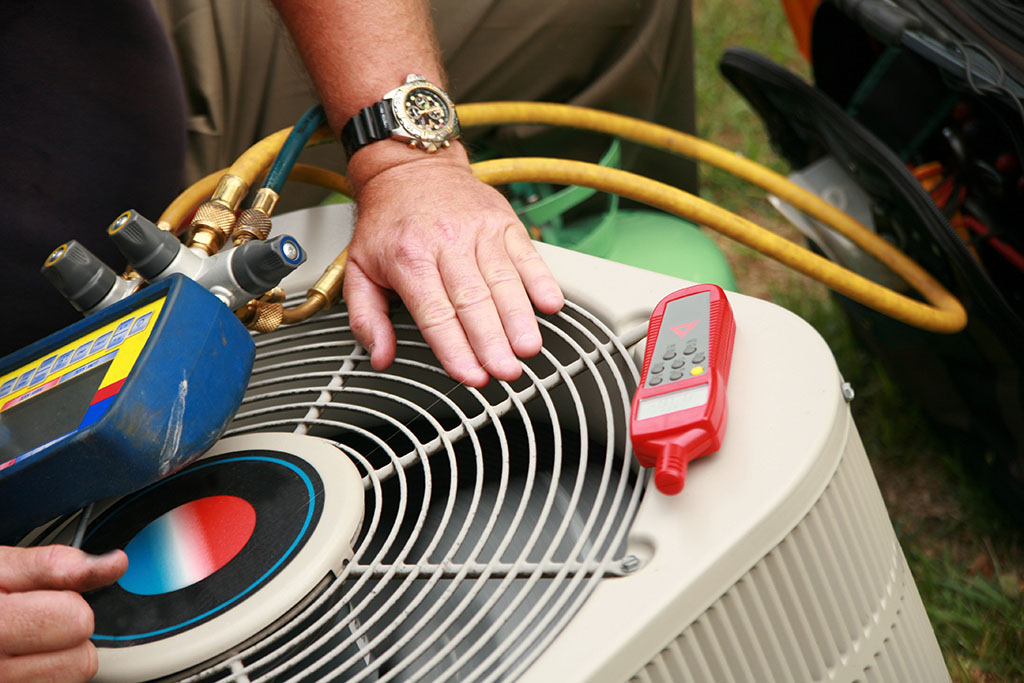
1. Your system is old
If your air conditioning system is close to 10 years old or is older, it is probably time to think about buying a new HVAC system. If your costs to cool and heat your home are running too high, your system may not be working efficiently. Newer systems are much more energy efficient, which can help you to save money on your utility bills. R22, the refrigerant that was used in older HVAC systems, is currently being phased out because of environmental regulations. Replacing the R22 refrigerant in an older central air conditioning unit is also costly.
2. Excessive repairs and high utility bills
If you find that you are having to have your air conditioning system repaired frequently, it may be more cost-effective for you to purchase a new system than to continue spending money on repairs. If your utility bills have substantially increased, purchasing a new air conditioning system may help you to get them under control.
3. Dust and noise
if you notice that your air conditioning unit is very noisy, it might indicate that your central HVAC unit may have an indoor coil that is failing. Excessive noise might also indicate that the ductwork that you have is insufficient for the size of your home. If your home always is dusty despite cleaning, it is an indication that you have leaks in your ductwork. Leaky ductwork will make it more expensive to operate your HVAC unit and will make it work less efficiently.
4. Too much humidity
Central air conditioning systems are supposed to remove humidity from the inside of your home so that it will be more comfortable. If you notice that your home has too much humidity inside, your central air conditioning system is not working properly. You can obtain a repair estimate and determine whether it is worthwhile to make the repairs or to purchase new HVAC equipment.
5. Inconsistent cooling patterns
If you notice that your air conditioning system does not cool all of the areas of your home equally, it is not working correctly. Air conditioning systems are supposed to provide consistent temperatures throughout your home. You could have a system that needs repairs, or your system may be too small for the square footage of your home. If your system is too small, it can cause it to work too hard, be less efficient and break down much quicker than if you have a unit that is large enough for your home.
Replace air conditioner equipment with Mahle Cool Air & Heating
If you believe that it is time for you to purchase a new HVAC system, it is important for you to talk to the professionals at Mahle Cool Air & Heating. Our highly knowledgeable and skilled technicians have an average of 25 years of experience. A family-owned business that is in good standing, Mahle Cool Air & Heating proudly serves residents of Sarasota, Venice, Englewood, North Port, and others. Call or text us today at (941) 203-7955 learn more and to receive a quote.
Your Air Conditioner, Humidity and AC Drain Lines Explained
Your air conditioner--when working properly--draws moisture from the air and generates water as part of the condensation process. The water produced by the AC system typically runs out the back of the unit or drains into condensation pan attached to a drain line designed to channel the water to a safe area. If you don’t pay attention, water can collect inside the system or drip into areas of your home causing damage.
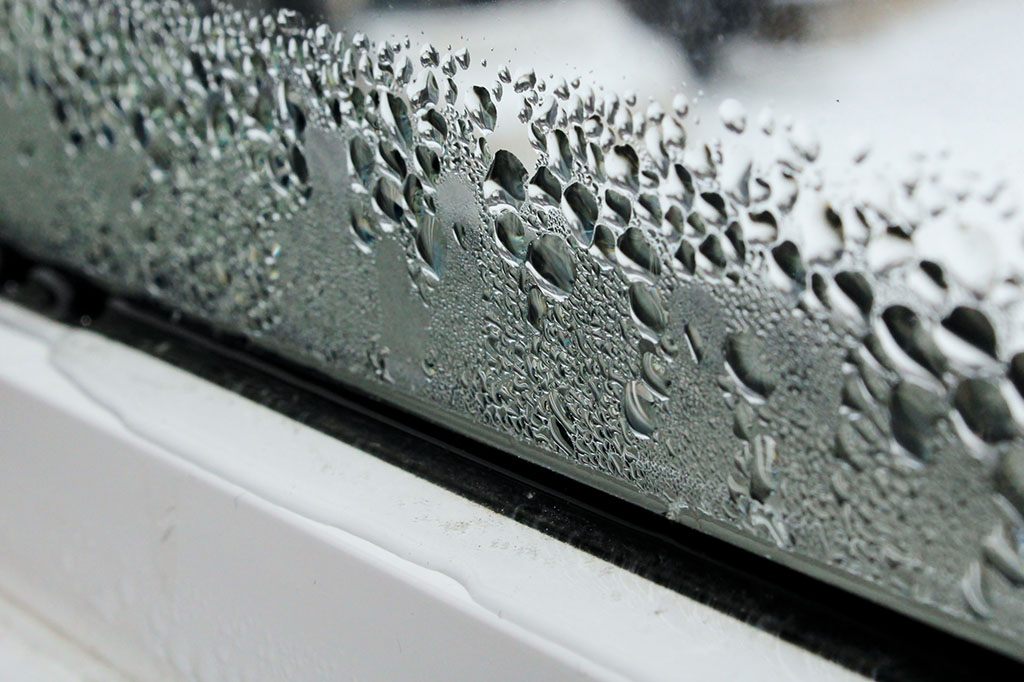
That’s why it’s important to understand how your system works, the effects of humidity and where your AC drain lines are located.
How AC Systems Work
HVAC systems generate water when cooling homes. AC units feature two sets of coils that continuously heat and cool the ambient air. The coils are connected by a condenser that rapidly heats and cools the air and evaporates and condenses water from the humidity in the air. Condensers use refrigerant chemicals to facilitate the cooling process. The refrigerant cools the coils, which cool air that flows over them. Moistures condense on the coils. Some water re-evaporates to provide additional cooling, but the process produces more moisture than can be handled. This water must be channeled out of the system. You’ve probably observed dripping window-AC units. All cooling systems must drain excess water, or problems will develop. The problems of excess moisture and clogged drain lines include:
- Water Blown by Internal Fans
If excess water gets blown back onto the coils, it can begin to ice over. That’s why many AC units “freeze up” and stop cooling properly. Many people understand that it’s sometimes necessary to turn off a unit to melt excess ice on the coils. You can speed the process by using a hairdryer to melt the ice faster. You should never try to chip off the ice because this can damage the coils. - Unsealed Units
Units that are improperly sealed--especially window units-- can allow warm, humid air to infiltrate the home. This puts more stress on cooling units, and the warm air can cause condensation on the outside of the units, which drips onto floors. - Clogged Drain Lines
Drain lines can get clogged from mold and algae growth, which dramatically affects AC performance. Clogged drains result in water overflowing the drain pans and damaging your home’s infrastructure and your AC system. Some systems have sensors that will turn off the systems when the AC drains get clogged. You can deal with a clogged drain by turning off the unit at the breaker and removing the condensation pan. If the pan is holding water, the drain is probably clogged. Dump the water, and clean and dry the pan. Use a shop vacuum to apply suction to the line to clear it. Once clear, pour distilled vinegar or hydrogen peroxide down the drain to dissolve any remaining growth. - Improper Sizing
If your unit isn’t big enough to handle your cooling needs, it will likely produce excessive water. One solution might be to use a dehumidifier. Dehumidifying the home has the added advantage of allowing you to set your AC to a higher temperature and remain comfortable. - Water Damage
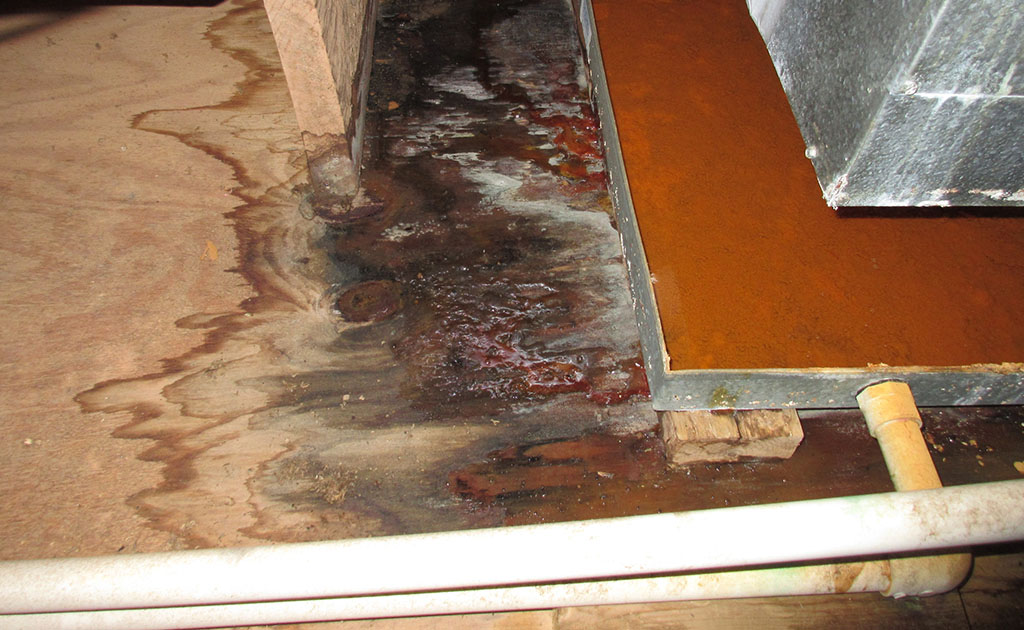
Excess water can damage all parts of your AC system. You might require parts or system replacement if the excess water isn’t addressed for a long time. Water intrusion from AC units can also damage your home and decrease AC efficiency.
Florida’s Heat and Humidity
In Venice and the surrounding areas of Florida, hot and humid weather is a year-round concern. Winter is more likely to be hot than cold, so residents worry more about humidity and comfort than heat. AC bills are big concerns, and keeping track of the water drainage of your cooling system is one of the best ways to keep bills lower and prevent problems.
Water Intrusion in AC Systems
Water intrusion in AC systems in Florida is a major issue, so residents should keep track of how well their systems drain any excess water. The growth of mold and mildew in hot, humid weather is a constant problem, but you can check your drain lines regularly to keep them clear. The first step is getting familiar with your AC system and learning where your drain line is and where it drains.
You can monitor your air conditioner and make minor repairs, but if your quick fixes don’t work, you might need professional HVAC service. Experienced technicians have the answers and tools to make your life in Venice, Florida more comfortable. Regular repairs and maintenance save money over time and create a better quality-of-life for you and your family. Call or text us at (941) 203-7955 for more information.
How To Size A Replacement Air Conditioner In Southwest Florida
Air conditioning is a necessity of life in Florida's hot climate. Although people can get away with neglecting their air conditioner in other parts of the country, homeowners in Florida have to keep their air conditioner in good shape to avoid cooling outages that have potentially dangerous consequences. With over 100 days of temperatures exceeding 90 degrees each year in Florida, the possibility of heat stroke is a serious concern for homeowners who fail to keep up with air conditioner maintenance. Additionally, living daily life without adequate cooling can be exhausting and uncomfortable. To keep your home cool, it is important to replace your air conditioner when it reaches the end of its useful life.
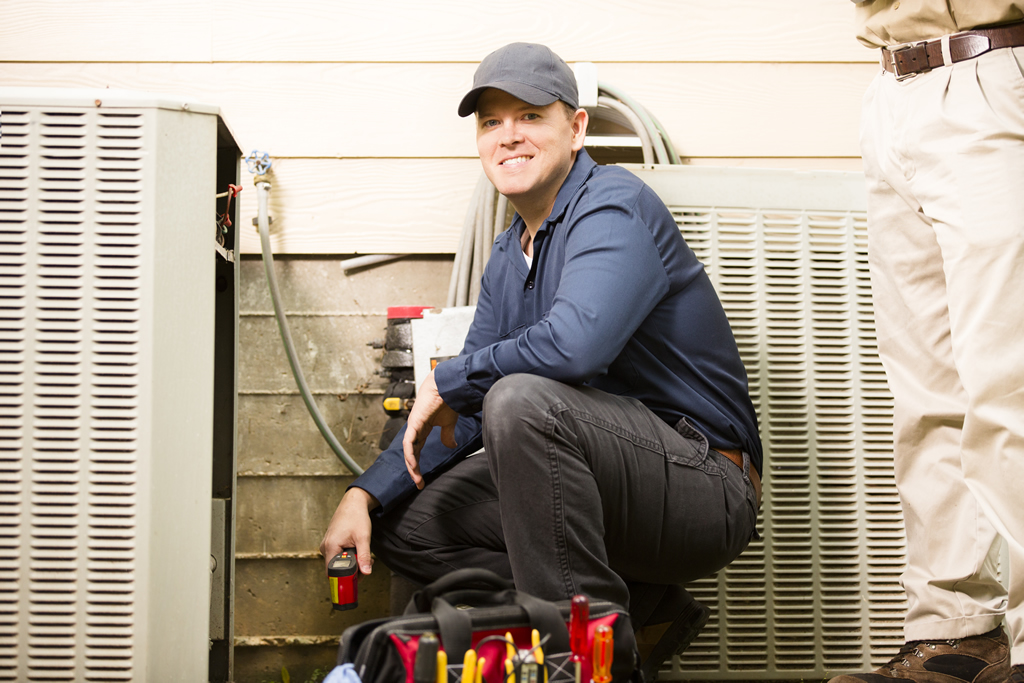
Importance of Choosing the Right Size
When choosing an air conditioner, the first factor that you should consider is the size of the unit that is right for your home. If you are using window air conditioners, you will need to find units that fit snugly inside your window frames without leaving gaps that can provide entry holes for pests. Size is equally important when choosing a central air conditioner because you will need to find an air conditioner that meets the specifications of your home. Choosing an air conditioner that is the right size for your home will ensure that your cooling unit is functional and aesthetically pleasing.
Consider BTU Output
One of the most important factors to consider when choosing an air conditioner is the BTU capacity necessary to cool your home. If your previous air conditioner was installed by a licensed professional, calculations were probably done to make sure that your air conditioner had a sufficient level of output. Start by researching the BTU capacity of your old air conditioner to establish a starting point for determining how much BTU capacity you will need. In general, you will need about 24,000 BTUs to cool 1,500 square feet of living space. You should, however, run the numbers to determine exactly how much capacity you will need.
Calculating How Many BTUs You Need
Before purchasing an air conditioner, you should be sure to calculate the BTU capacity necessary to cool your home. Experts generally recommend that homeowners have at least 16 BTUs of cooling capacity per square foot of living space. You should keep in mind that there is a broad range of factors that can increase or decrease the capacity that you will need. Some of the main factors to consider include:
Hot Florida Weather: Many of the BTU calculations that can be found online are not designed for Florida's hot climate. Florida residents should have air conditioners with 20 percent more BTUs than normal to prepare for scorching heat waves.
Ceiling Height: Tall ceilings mean cooling more cubic feet of living space. A home with 10-foot ceilings requires about 25 percent more BTUs to cool than with ordinary 8-foot ceilings.
Insulation: Unfortunately, many older and inexpensive homes in Florida do not have good insulation. Poor insulation can increase the amount of power necessary to cool your home by as much as 60 percent.
Choosing Air Conditioner Size
The physical dimensions of your air conditioner are also an important factor to consider. If your air conditioner is too large, it could give your home an unsightly appearance. Size is especially important when choosing a replacement air conditioner because changing sizes can require expensive equipment modifications.
You should try to find an air conditioner that is the same size as the original air conditioner that came with your home. Make sure that your new air conditioner will fit on your concrete pad and that the pipe going into your home has enough throughput to support the output of your new air conditioner. When choosing an air conditioner size, you may also want to consider how you will hide your new air conditioner. If the plants surrounding your existing air conditioner are not tall enough to cover a more lofty unit, you may have to factor in the cost of additional landscaping work. Call or text us for any questions (941) 203-7955.
Keep Your Air Conditioning Bills Down By Shading Your Air Conditioner
If you want to save money on your air-conditioning bill but don't know where you should start, you could be wondering what steps will help you reach your goal. Most people don't realize the location and condition of their outdoor unit plays a role in how much they pay for energy each month.
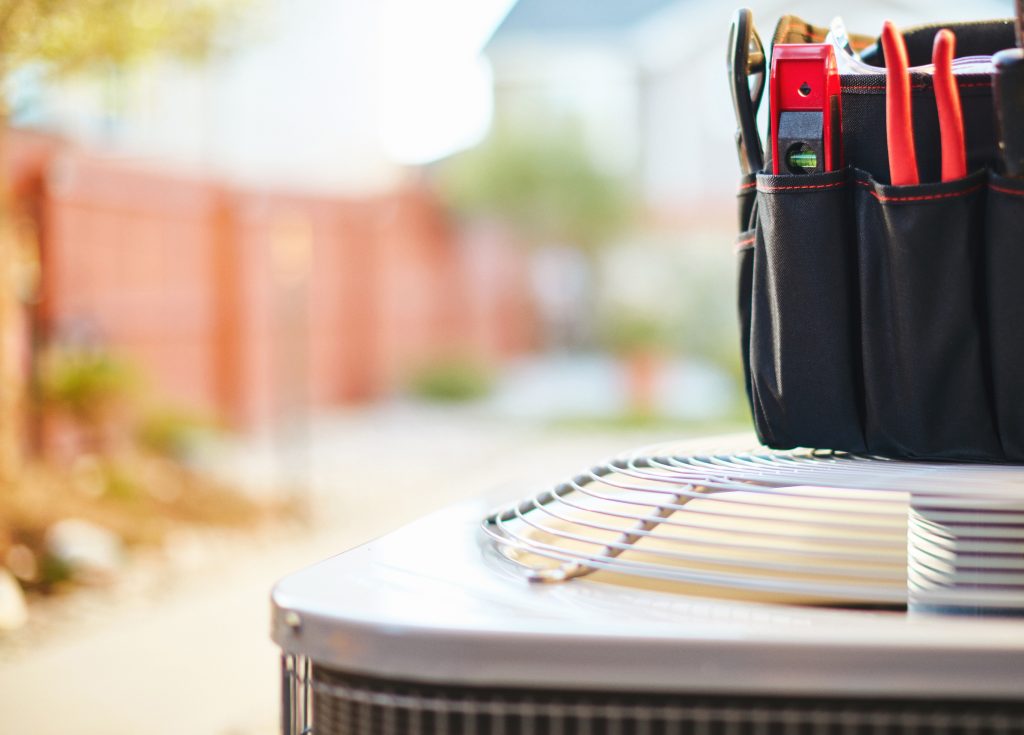
Shading your unit from the sun's hot summer rays is a great way to keep more money in your pocket. You will learn why shading your air-conditioning system makes a difference and get a few ideas on how to move forward.
Why Cooling Your Outdoor Unit Matters
Take a look at how your air-conditioning unit works when you want an idea of how shading it can help you save money. In simple terms, your unit sucks in air from the environment and cools it before blowing the air into your home. Allowing your unit to heat up forces it to work much harder to do its job properly, and your bill will go up as a result. Keeping your air-conditioning unit cool reduces the amount of work required to cool your home. The savings will then speak for themselves.
Plant Trees and Shrubs
Planting trees and shrubs around your yard is a great way to protect your air conditioning system from the hot sun during the summer months. You can get the best possible results by choosing trees that match the look and style of your home and environment. Consider how big the trees will grow so that you don't plant them in a dangerous spot. Planting trees in your yard can also shade your windows from the sun, and you will take your savings to a whole new level.
Install an Awning
Not everyone wants to plant trees in their yard, and some are even unable to do so for a range of reasons. No matter the reason, you can opt to install an awning over your unit to keep it as cool as possible when the temperature peaks. Choose between a standard and retractable awning depending on your needs and goals. Since they leave the awning in place more often than not, most people use a standard awning.
You don't want to buy an awning and find that it won’t fit in your yard. Before you spend any money, measure the amount of space you have around your air-conditioning unit. Also, pay attention to the sun to discover the angle from which it hits your unit most of the time.
Place a Tent Around Your Unit
If you don't want to spend money on trees or an awning, you are not out of options yet. You can go to the store and buy a tent to place around your air-conditioning unit when your goal is to reduce your energy bill. Don't make a final decision until you know what size is right for your situation, and you won't face unneeded complications along the way. If you live in an area with heavy rain or wind, stabilize your tent to prevent it from blowing away or falling apart when you least expect it.
Consider Moving Your Unit
You might not have any viable options when it comes to shading your air conditioner from the sun, but you don't need to give up yet. You can move it when everything else fails to do the trick. People sometimes want to move their unit without getting help from an expert, but you don't want to follow in their footsteps. Unless you are a trained professional, you could make critical mistakes and damage something without realizing what has happened. Always contact a team of experts when you need to relocate.
Final Thoughts
Shading your air conditioner is a great way to protect yourself from unreasonable energy bills over the summer. You might think doing so won't make much of a difference over the long run, but you must try it for yourself to see the impact it can have. To get an accurate number, compare your energy bill after you make the change to before you installed the shade. Those who have already done so report an average savings of $200 per year. The steps you take to save money matter and add up over the years, and you will be thrilled when you discover how much you can lower your power bill. For further assistance, call or text us at (941) 203-7955.
The Role of Humidity on Heating and Cooling in the Home
The excessive Florida heat, combined with humidity. makes us feel hotter, and also has a significant impact on A/C systems. However, many people don’t know that humidity also affects heating systems.
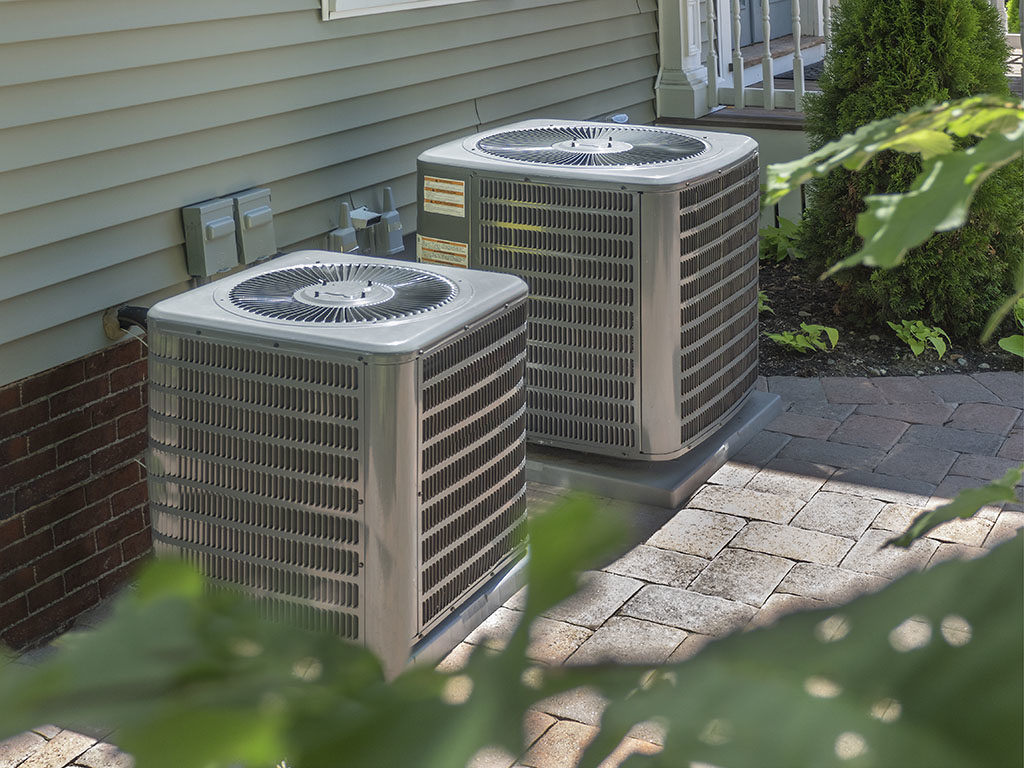
The humidity inside a home matters, because it directly contributes to the home’s comfort level. The HVAC systems of today have begun to include tools to help control humidity, including checking levels and adjusting with humidifiers or dehumidifiers, as needed. Understanding how humidity affects the indoors, and why it needs to be controlled, is the beginning step toward lowering energy bills while maintaining a comfortable home.
Humidity and Air Conditioning
As mentioned, humidity affects how well the A/C unit cools the home. The cooling unit works by taking moisture and heat out of the air. This means that higher humidity levels make the unit work much harder. The unit must have an adequate cooling capacity to handle both the heat and the humidity. There are a few ways to know if the humidity is simply too high for the unit to handle.
- Clammy, sticky feeling. If your skin feels sweaty and clammy indoors, the humidity may be too high.
- Windows fog over. This is due to the vaporized water droplets in a humid home.
- A strange smell. A musty, old attic type of smell signals excessive humidity. This is because the home is constantly damp.
A strong A/C system will take moisture out of the air and help reduce humidity levels. However, there are hot summer days when the unit will not be able to handle the excessive moisture levels. Humidity will cancel the cooling process of the unit, and the home will feel warmer. The unit will continue to run but there will be little to no benefit from it. The home is not being cooled effectively, and money is being tossed out the window.
This is why many people may purchase a larger A/C unit, believing it will be more effective in home cooling. That larger unit will not necessarily be more effective. If the overall capacity is larger than the home needs, it won’t handle the excessive moisture effectively. The humidity level inside the home will stay high. Those larger air conditioners won’t run as often, and won’t be able to take enough moisture out of the air. It is essential to buy a unit that is suited for your home size.
Beating The Heat in the Air
The best way to combat humidity year round is to make sure a dehumidifier is installed on the HVAC system. The moisture will be pulled out of the air before it enters the home. A dehumidifier that is paired with an air conditioning unit allows you to control dehumidifying levels and temperature from a central gauge inside the home.
When the humidity level is controlled in the summertime, the air conditioning unit works better. The home feels cooler and is far more inviting in the Florida summer heat. Additionally, you’ll stop throwing away money and the energy bill will be a little lighter. All other issues, such as musty smells, foggy windows or clammy skin should also disappear.
Humidity and Heating
Wintertime brings low humidity levels, which might seem like a relief. However, the lower humidity actually causes problems for heating systems. As humidity levels drop, the home feels colder than its actual indoor temperature. As with the A/C unit, the heater starts to work harder, but the home still does not feel warmer. You’ll turn up the heat looking for relief that will never come because there is not enough moisture available to warm up the air around you.
The ideal setting for a thermostat is between 72 and 75 degrees. This range is most effect for cost and comfort. However, this range stops working when the humidity level is below 50%. The apparent temperature, which is how a home feels, will be lowered below this percentage.
The best way to combat this issue is with a humidifier in the wintertime. Similar to the dehumidifying device, this device can be attached to the HVAC system. It will add moisture to the dry winter air before it comes into the home. Relative humidity will be kept higher than 50%, making the home feel warmer. As in the summer, the end result is a lower energy bill. The system can be monitored from a central gauge inside the home, so heating and humidity levels can be adjusted simultaneously.
Keeping the humidity inside the home balanced is the secret to reducing energy bills and maintaining a comfortable home. Many people do not realize that a simple adjustment to the HVAC system will reduce year-round energy bills and create a comfortable living environment. Further, the system can be fully controlled from inside the home through every season. One simple adjustment will improve the overall function of the home and provide a place to escape the fickle, sometimes harsh Florida weather. Call or Text us today for more details (941) 203-7955.
Get Your Air Conditioner Ready For Florida Summer Temps
As summertime approaches in Florida, homeowners from Sarasota to Venice to Englewood and every city and town in between begin looking for ways to prepare for the increased, humid temperatures. Preparing the air conditioning unit for the weather ahead is the best way to keep energy consumption (and costs) down and maintain comfort throughout the home.
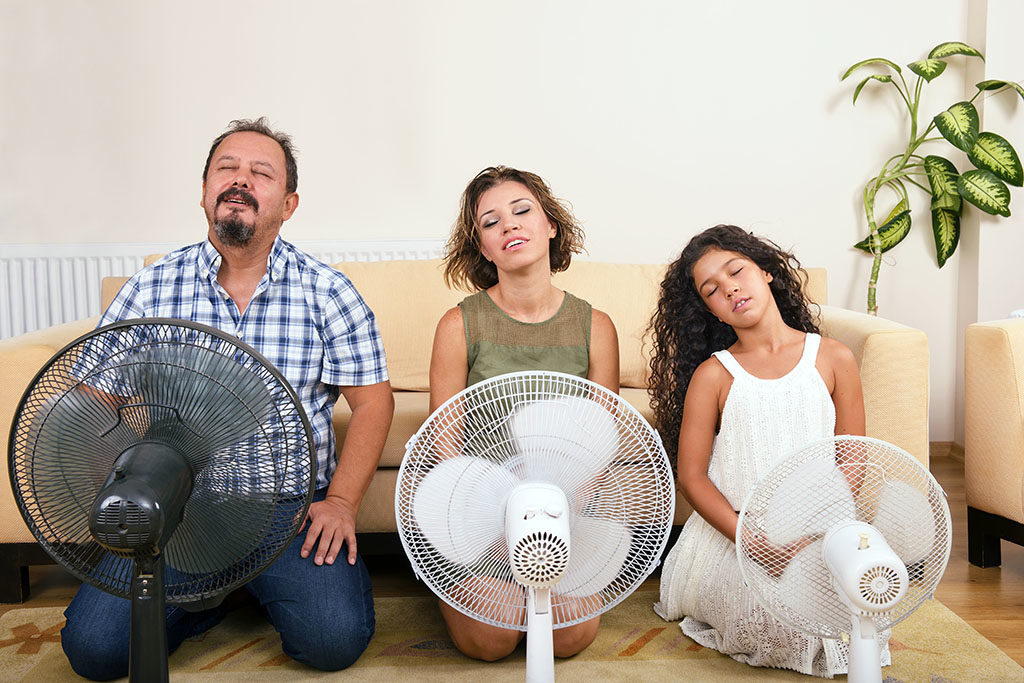
To prepare your air conditioning unit for the summertime weather, first ensure that you understand how the unit works.
Three components make up the A/C unit. This is the condenser, blower unit, and the ductwork. Each of the three components serves an important function in the overall operation of the air conditioning unit.
Ductwork: Metallic, flexible tubes that run through the home are known as the ductwork. The tubes route cold air into the house and remove the hot air. Leaking ductwork is a common problem with this component, though it is safe to say there is a problem if you notice more dust in the home than usual. The leaking ductwork causes an even more serious problem, however, and that is air leakage. Any space between the wall that is leaking is also causing the cooled air to blow between. This causes difficulty cooling the house. Springtime is the perfect time to inspect and/or clean the ductwork to improve AC performance and efficiency.
Condenser: The condenser is the unit sitting outside the home. The refrigerant is added to the condenser, which controls temperatures inside the home. The refrigeration works to absorb heat after the air flows over the evaporator coils. A pressure change causes the refrigerant to turn into a gas that resumes liquefied state when it is cooled again.
Blower Unit: The blower unit helps change the liquid into a gas as the refrigerant enters this space and travels into the coil. This unit draws the warm air into the return ducts while the air conditioning unit pushes the air over the coils into the house to keep it cool. The refrigerant goes back into the condenser and converts back to liquid state after completion of this process.
How to Prepare Your Air Conditioner for Summer
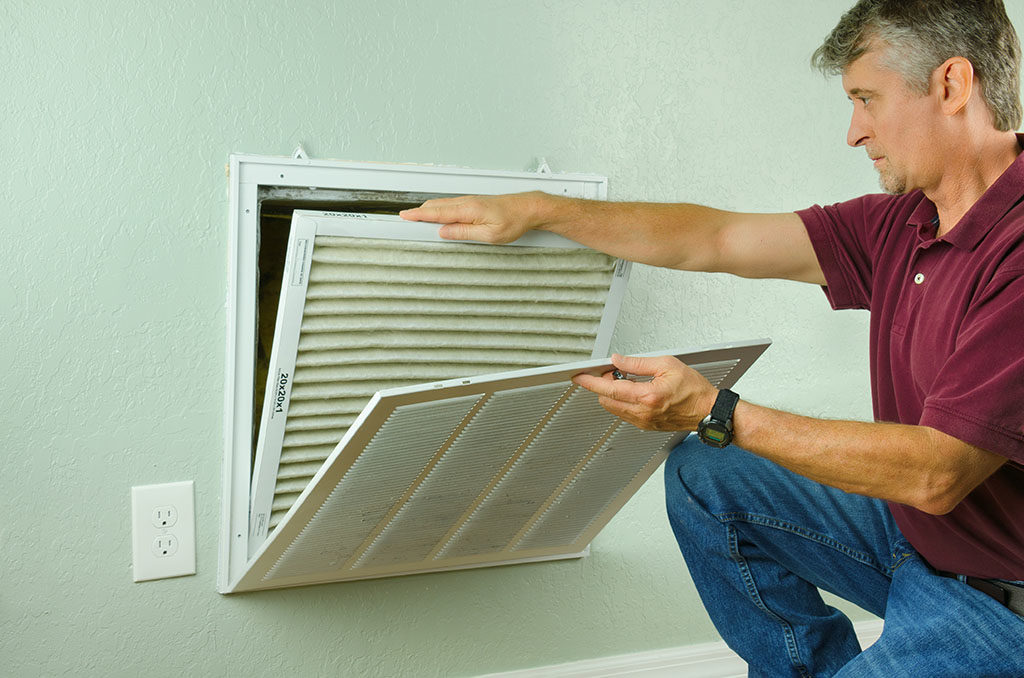 Professional repair serviceman or DIY homeowner removing a dirty air filter on a house air conditioner so he can replace it with a new clean one.
Professional repair serviceman or DIY homeowner removing a dirty air filter on a house air conditioner so he can replace it with a new clean one.
Air Handler Filter Change
Dust, pollen, and other debris are collected inside of the filter. If the filter becomes filled, it performs the opposite job and begins blowing the collected items back outside the unit. The result is decreased comfort, increased energy costs, and an unhealthy environment inside the home. Dirty filters also damage the unit, decreasing its longevity and durability. It is one of the most important components of the A/C unit. Monthly filter changes ensure these issues do not become your own.
Keep the Condenser Unit Free of Debris
Debris and trash can accumulate around the condenser unit outside the home. This causes improper air circulation that damages the A/C unit and its components. Ensure that no debris or trash is allowed around the outdoor unit. Additionally, use these tips to prevent issues with the outdoor unit:
- Use a garden hose to wash the dirt away from the unit
- Trim grass around the unit, keeping it at a short length
- Keep bushes away from the unit
- Do not allow tree branches to overhang on the unit
- Do not place other items on or near the unit
Clean the Condensate Drain
There is a thin piece of PVC pipe situated close to the condenser unit. You'll notice water dripping from this unit. This is normal, though the moisture build-up can attract algae that clog the line; condensation is the result. This may cause water to enter the home, triggering the cooling equipment to shut-off.
It is simple and necessary to clean the drain. Just remove the end of the drain and use a wet/dry vac to remove the slide and water accumulated in the drain. Replace the end when finished.
Check Refrigerant Levels
There are two copper lines running to the condenser unit. Find the larger of the two lines. Sometimes there is insulation around this line. If the line doesn't sweat during A/C cycling or the line is warm after the unit is running, coolant is needed.
Level the Condenser Unit
Check to ensure that the condenser unit is level using a level. Gravel or a small board can help fill any uneven spaces.
A/C Maintenance Inspection
Finally, call a professional A/C repair company Mahle Cool Air & Heat for an annual maintenance inspection. Air conditioning maintenance prolongs the lifetime of the HVAC unit while reducing discomforts and need for repairs. Reduced wear-and-tear is another benefit of this annual inspection. A/C pros thoroughly inspect the unit, looking for signs of damage or breakdown. Those issues are then immediately repaired, reducing headache and hassle. Call or Text us today for more details (941) 203-7955.
Learn the Pros and Cons of Mini-Split Heat Pump HVAC Systems

If you're upgrading your HVAC system or choosing one for a new construction, there are many great heating and cooling products. A mini-split heat pump is a viable option if your home doesn't have ductwork. Learn more about this type of system and how it can efficiently keep you comfortable throughout your home.
Understanding a Mini-Split Heat Pump System
This HVAC installation uses mini-split technology with a heat pump. It's ideal if you already have a ductless system or don't plan to install one. The mini-split is also a great choice when you add a room to your home but extending the ductwork isn't possible.
The system has two main components: an exterior compressor and condenser and an interior air handler in several rooms. It heats spaces by pulling air from outdoors, heating it and releasing it into the rooms. It also cools spaces by pulling warm air out of your house.
Pros of a Mini-Split HVAC System
Mini-split systems offer several advantages to other HVAC equipment, including cost. They're a more affordable option for homes that don't have existing ductwork. Because of their design, they're more energy efficient than central HVAC systems that lose about 30 percent of heated and cooled air in the ducts.
Mini-splits consume less energy too because they maintain zoned temperatures. You can adjust where you need more heating and cooling instead of changing the thermostat for the entire house.
The zoned temperatures also maximize comfort for each person in your home. For example, kids at play indoors might need to turn down the thermostat while you relax in another room that's set for your comfort. The whole family doesn't have to suffer just because one person likes cooler or warmer temperatures.
In addition, there's more flexibility when it comes to installing mini-split systems. They eliminate having to install ducts and only require a small, 3-inch hole in the wall where the handlers connect to the exterior unit. Installers can also hang them on walls, suspend them from the ceiling or mount them into drop ceilings. You can even get floor-standing models.
Cons of a Mini-Split HVAC System
Fortunately, there aren't many disadvantages to choosing a mini-split heat pump for your home. If you already have ductwork, then installing this system may cost more than replacing the central HVAC unit that you have. Although, you might be able to offset the cost with local incentives and rebates.
Installing this HVAC system isn't a do-it-yourself project either. It requires the skill of a trained installer because not placing the exterior and interior units correctly affects how the system functions overall. Having them in the wrong places may reduce the energy efficiency of the whole system. Each air handler also needs to be the correct size for each room to properly control temperature and humidity.
Furthermore, you might not like how the air handlers look inside your home. Vast improvements have been made throughout the years to improve the aesthetics, and many units look quite stylish. However, they're more noticeable than central HVAC vents.
Find Your HVAC System Today
If you need a new heating and cooling system in Venice, Florida, Mahle Inc. Cool Air & Heating offers a complete line of Bryant equipment. Our knowledgeable staff can educate you further about which type of system may work best for your home. Call or Text us today for more details (941) 203-7955.
